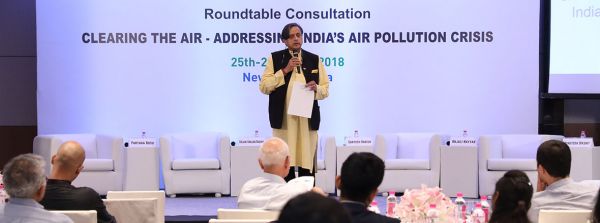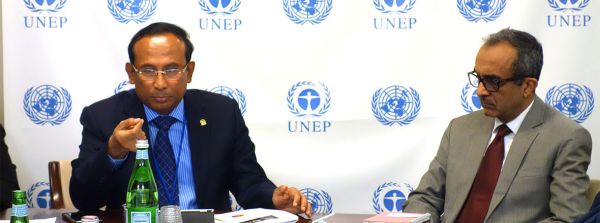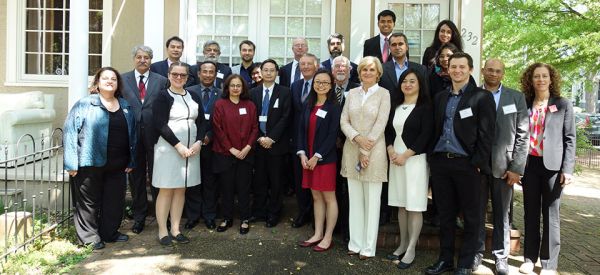
President Trump announced recently to a baffled world that the United States would withdraw from the Paris Agreement. Or in his own inimitable words, “we are leaving, . . . we will renegotiate a better deal . . . #AmericaFirst.”
by Shazia Rafi, AQA President, PassBlue
The reactions from other world leaders were fast and furious, with the strongest words coming from the newly elected president of France, Emmanuel Macron. He made it quite clear there would be no renegotiations, that Paris would step up to the leadership challenge to #MakethePlanetGreatAgain, as he tweeted.
Two major international legally binding treaties were negotiated on my watch while I was secretary-general of Parliamentarians for Global Action, a network of legislators: the Rome Statute of the International Criminal Court and the Arms Trade Treaty, both of which our organization worked on intensively. Such legally binding agreements and treaties are like the Bates Hotel, you can check out but you can’t leave. Paris Agreement rules will continue to apply to rest of the world and to major sectors of the US that trade with the world.
Trump’s announcement on June 1 ignores six key facts.
Fact 1: The Paris Agreement is a legally binding agreement, ratified by 147 countries, many by majority or unanimous vote of their parliaments. That means it is law in their territories, including for US companies wanting to do business with them. Trade and investment both in their territories and by their companies operating abroad will be governed by its rules.
The US is one of 193 countries that signed the Paris Agreement. That means means those countries have agreed to abide by the accord’s rules even if their legislatures do not make them legally enforceable national law. A wide swath of the world will navigate accordingly.
Fact 2: The process to leave a legally binding agreement can take three to four years, with considerable administrative and legal cost. No estimates of how much time or costs were offered by Trump in his announcement.
Fact 3: Major US allies and trading partners are bound by the Paris Agreement, so “leaving” while being the highest per capita emissions producer is a step down from a diplomatic leadership position, which the US will be unable to reclaim. Jobs for American citizens in international environment agencies will be harder to get and senior positions will go to other countries.
Fact 4: The US has already met half of its target obligations under the Paris Agreement. The figures quoted by Trump on the burden of meeting the Paris accord’s obligations are not substantiated. The renewable-energy sector is growing at a faster pace than traditional energy, outweighing job growth in coal by more than double. The solar energy sector alone produced 260,077 jobs in 2016 at an average hourly wage of $26.
This trend is irreversible even in Pittsburgh, as its mayor, Bill Peduto, pointed out in a tweet to the president (Trump: “I was elected to represent Pittsburgh, not Paris”; Bill Peduto: “As the Mayor of Pittsburgh, I can assure you that we will follow the guidelines of the Paris Agreement for our people, our economy & future.”) Ironically, the Kentucky Coal Mining Museum recently replaced its electricity generation with a solar roof.
Fact 5: California, the world’s sixth-largest economy; New York, Washington and nine other US states; and 86 US city mayors, including Peduto of Pittsburgh, said after Trump’s announcement that they would take formal steps to adhere to the Paris Agreement. These numbers will go up, and their environmental protection actions at state-city levels will cover up to 70 percent of US carbon emissions. There are also moves to create a United States Climate Alliance at the subfederal level.
Fact 6: China and Europe will step in to cover the loss of US funding to the United Nations Green Climate Fund. Former Mayor Mike Bloomberg of New York City has written to UN Secretary-General António Guterres to commit his philanthropic resources to cover the $15 million gap for the office of UN Framework Convention on Climate Change, the entity responsible for monitoring the Paris Agreement. Bloomberg’s gesture is reminiscent of Ted Turner, the US tycoon, pledging $1 billion to the UN to pay for the loss of US-assessed past dues to the UN under President George W. Bush.
Secretary of State Rex Tillerson, despite being a former chief executive of ExxonMobil, reportedly advised Trump against withdrawal from the Paris Agreement based, presumably, on State Department analysis of these factors.
The president’s action — if not guided by policy advice or scientific and economic facts — could be based on his continual election-campaign mode of operation; in this case, meeting a campaign promise to his base voters.
Or, more disturbingly, the reason behind his action could be very simple. Coming right after his first international meetings with NATO heads of state and governments in Europe, his decision to remove the US from the Paris Agreement might just be a cut-your-nose-to-spite-your-face reaction. Clearly, the interactions with European leaders left both sides disappointed, and Trump characteristically has taken a swipe at the club that found him wanting.
Read also
- COP29 Panel on Loss & Damage Finance Mechanism: Preliminary Report
- COP 28
- COP27
- Loss and Damage Finance Mechanism
- United Nations Climate Change Conference COP23
 The State of India’s Pollution Control Boards - Are they in the green?
The State of India’s Pollution Control Boards - Are they in the green?
Centre for Policy Research, April 2023
 Tracing the Hazy Air 2023 - Progress Report on National Clean Air Programme (NCAP)
Tracing the Hazy Air 2023 - Progress Report on National Clean Air Programme (NCAP)
Centre for Research on Energy and Clean Air (CREA), 2023










